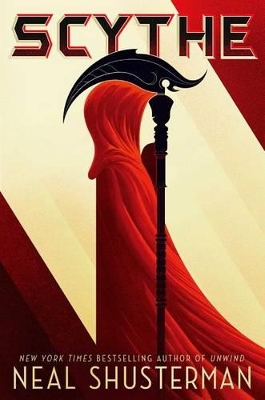Reviewed by HekArtemis on
There is no death, no illness. Everyone can access a basic and quite livable income, but everyone also has the choice to work and earn more money if they want. People have the right and are given the means to rebel against the system. In any real dystopia such unsavouries as we see in the second book Thunderhead would not be allowed to do what they do, they definitely wouldn't have a whole system designed just to meet their rebellious desires. It's just not dystopian in any normal way.
The Scythedom kills people, to control the population. The chances of being gleaned by a scythe are extremely low. Most people are not anti-scythe, they understand the need for death and while no one wants to be gleaned, they accept the necessity and humans chose this - the Thunderhead refuses to be part of creating and taking life. The Scythedom doesn't exactly oppress anyone - again, this isn't dystopian, not really. Harsh and scary sure, but not dystopian, not any more than nature is dystopian. The corruption within the Scythedom is where we begin to see the beginnings of a possible dystopia to come. But without that corruption, the world just is not dystopian.
Except when we look at it in a different way, and this is where I love the book even more. It is noted multiple times from the very start that the lack of natural death, the apparent immortality of people, and the fact that things like depression are able to be cured with nanites, has created a state of nothingness for humans. People aren't scared or angry or depressed, but they aren't happy either. They lack the ability to love properly. They care less. jobs are irrelevant, the Thunderhead can do anything and everything, so researchers and engineers are truly irrelevant. Everyone knows that their jobs are worthless, their lives are pointless. The Thunderhead in no way forces any of this on people - there is a group that deactivates their nanites, refuse to have their bodies reanimated after death, and people have the right and ability to opt out of pretty much everything the Thunderhead has to offer. None of this melancholy worthlessness is forced on people, they literally are choosing it for themselves. And that is where the dystopia really lies, if there is any - humans are individually choosing to put themselves into a meaningless existence.
I don't know if that is really dystopian though. It doesn't seem like it. Whatever it is, it is sad.
The basic ideas of the story were great on the surface, the execution is amazing. That it is impossible to really determine whether this world is good or bad, utopian or dystopian, is fantastic, so very well done. I love it. And while I have obviously fallen most for the world building, I will note that the characters and plot lines were great too. I just happen to really love the world more. I would say I am looking forward to reading Thunderhead, but I have already read it before finally getting to this review and it's amazing too. I look forward to The Toll.
Reading updates
- Started reading
- Finished reading
- 11 July, 2019: Reviewed
